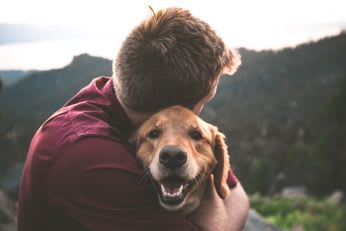
The loss of a pet is a traumatic experience and many people find it difficult to cope with the strong emotions that follow afterwards. Pets are loyal friends and companions and are often treated as valued members of the family, so feelings of grief when a pet dies can be intense.
If you have ever owned a pet (or perhaps you currently own lots of pets), it’s easy to understand the bond between humans and animals. According to the World Animal Foundation, about 66% of U.S. households have a pet so it’s clear to see that pets are a popular source of friendship, joy, and comfort for their owners. Emotional support and service animals are especially indispensable to individuals who benefit from their unconditional love and assistance. So when you lose a pet, a best friend, and a helper, it is only natural to feel a lasting sense of sorrow and loss.
Grief is very personal, and we all have our own unique way of coping with bereavement after the loss of a loved one. Remember that after losing a beloved animal companion, the grief journey can last for a long time – it is cyclical in nature and should not be rushed or ignored. If you are dealing with grief from losing a pet, here are a few suggestions to help you cope with your loss.
Express Yourself
Sometimes people feel embarrassed or guilty about grieving the loss of their pet, especially in front of others who think they should just “get over it” or “get a new pet.” Don’t stifle your emotions based on stereotypical societal messages – allow yourself to experience sadness, pain, anger, shock, etc. when you are mourning your pet friend. Repressing grief doesn’t make it disappear, and acknowledging your feelings is part of the healing process.
Talk to Others
Let your family and friends know about the loss of your pet. Talking about a beloved animal is a positive outlet for complicated feelings, and sharing special stories about your favorite companion and the important role they played in your life helps memorialize your relationship. Engaging with pet loss support groups is also a good way to find comfort, encouragement, and a listening ear if you need it. However, if you don’t feel ready to talk about your loss, write down your feelings in a journal or create a visual tribute instead.
Plan a Memorial
Holding a pet funeral or memorial service allows pet owners to honor their pets as they say a final goodbye. You can plan a pet funeral just for family and close friends, or arrange a more elaborate ceremony if desired. Pet funeral homes usually offer funeral or cremation packages where they take care of all the planning and burial details according to your personal wishes.
Help Children with Grief
If you have children, keep in mind that they might need extra help dealing with the loss of a family pet. This could be their first experience with death and thus they may not understand the depth of their feelings. Here are a few ideas on how to help children cope with grief.
*this article has been updated on March 28, 2024 to reflect the latest research and statistics.








